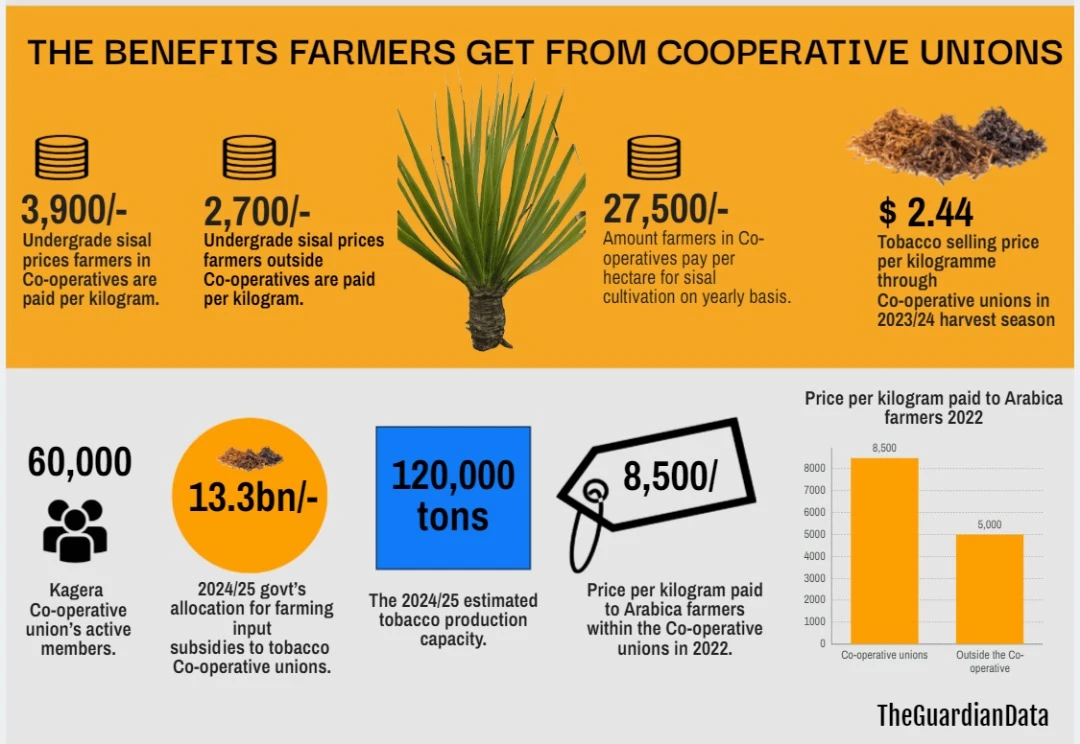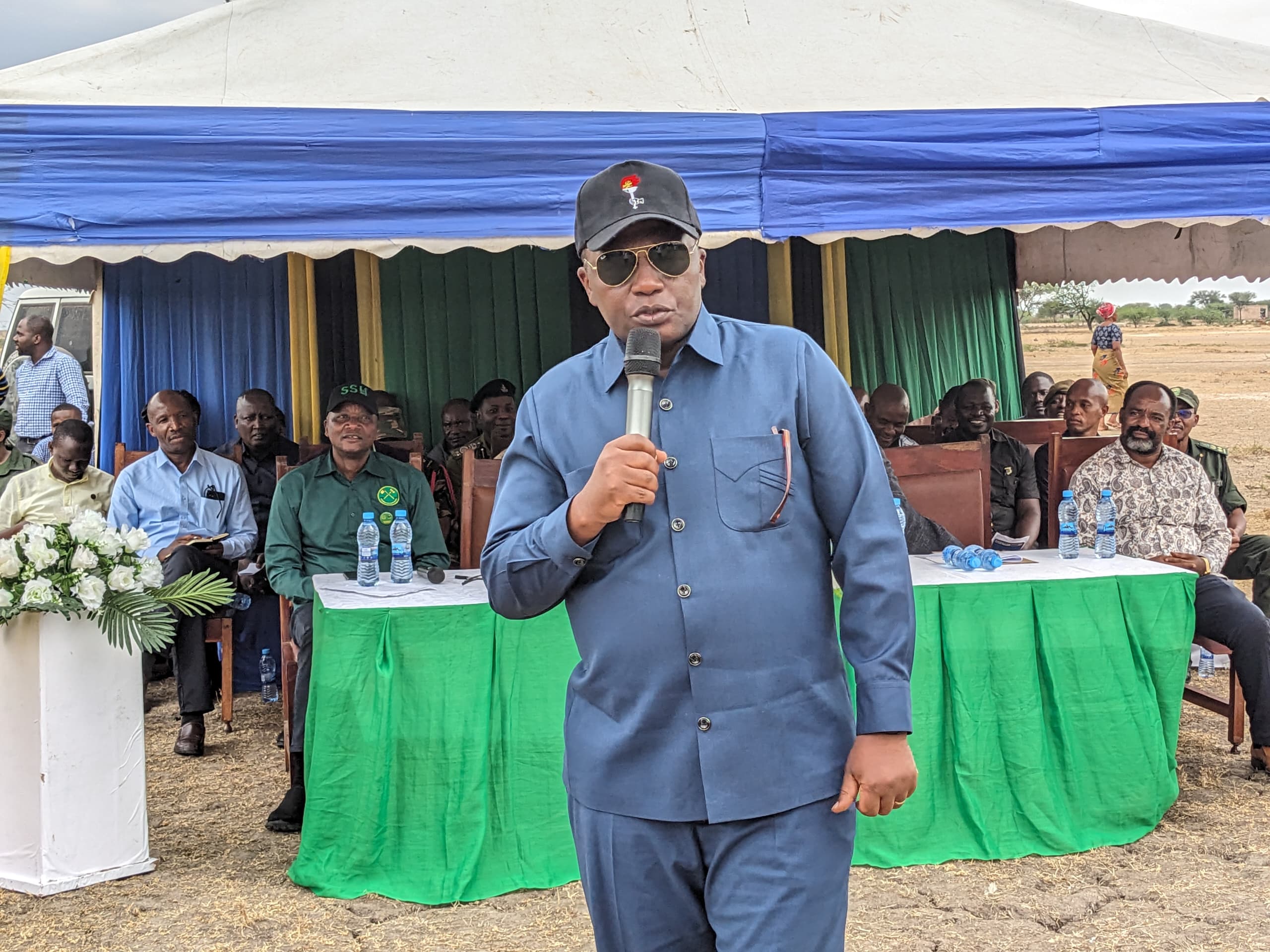Farmers in Co-operatives earning big via cash crops value chains - I

SMALLHOLDER farmers engaged in cash crop value chains are not just transforming their livelihoods; they are rewriting their futures through membership in registered agricultural cooperative unions.
By uniting under these cooperative frameworks, farmers are unlocking remarkable income potential, selling their agro-products to both local and international bulk buyers. They enjoy prices significantly higher than those received by their peers who operate outside these collaborative agricultural schemes.
Monica Fidelis, an Extension Officer and proud member of the Magunga AMCOS in the Korogwe district of the Tanga region, highlighted that AMCOS is one of only five societies in the area actively shaping the sisal cash crop value chain.
She emphasized the stark contrast in earnings: farmers affiliated with the cooperative earn twice as much as those who are not, a testament to the power of collective bargaining.
Through a streamlined tender process orchestrated by the Tanzania Sisal Board (TSB) in partnership with the Cooperative Registrar's Office, buyers are efficiently matched to sellers. This season, the licensed buyer, Agriculture Fiber (T) Limited, stands ready to engage with the cooperative, ensuring that these farmers reap the rewards of their hard work and collaboration.
Monica highlighted a significant advantage of farmers joining co-operatives: the establishment of Savings and Credit Cooperative Societies (SACCOS) within each AMCOS. These SACCOS play a crucial role in facilitating money circulation during the six-month non-seasonal period, providing farmers with vital financial support when they need it most.
She noted that the AMCOS was founded in 2017 and has since grown to encompass 365 members, a testament to its community-oriented approach and the trust it has fostered among local farmers.
Under the auspices of the Co-operative Union, sisal is sold in various grades, with pricing structured as follows: Three Long at 4,300/- per kilogram, Three Short at 4,100/- per kilogram, Undergrade at 3,900/- per kilogram, Sub-standard at 3,300/- per kilogram, TOW 1 at 2,200/- per kilogram, TOW 2 at 1,200/- per kilogram, and Unwanted fiber at 2,200/- per kilogram. This pricing illustrates the premium quality that co-operative members can achieve through collective efforts and access to better resources.
Monica asserted that the AMCOS began production in 2019, utilizing government-leased farms at a competitive rate of 27,500/- per hectare annually, enabling members to scale their operations effectively.
She emphasized the challenges faced by outgrower sisal farmers not affiliated with co-operatives. These farmers often struggle to produce high-quality Three Long and Three Short fiber grades due to the limitations of their small-scale processing machines. Consequently, many produce predominantly Undergrade fiber, which they sell for only 2,700/- per kilogram, reflecting the poor quality resulting from outdated processing techniques.
In contrast, co-operative members benefit from high-tech modern machines, allowing them to produce Undergrade fiber at a more favorable price of 3,900/- per kilogram. “The difference in quality and pricing,” Monica explained, “is a direct reflection of the superior processing capabilities available to those within the co-operative framework.”
Monica asserted that trading through co-operatives transcends mere profit and easy access to farm inputs; it actively contributes to the realization of Sustainable Development Goals (SDGs) for individual members. This perspective aligns seamlessly with the vision of the International Co-operative Alliance (ICA), which embraces a range of SDGs aimed at transforming lives for a brighter future.
The ICA emphasizes that co-operatives are vital in achieving SDG 1, which focuses on reducing poverty by addressing the social and economic needs of their members. Additionally, co-operatives promote SDG 8, advocating for decent work through their democratic, member-based approach that prioritizes community welfare.
Moreover, co-operatives align with SDG 12, emphasizing responsible production and consumption, as well as SDG 17, which fosters collaboration among co-operatives. This collaborative spirit enhances their collective impact on sustainable development.
Juma Shishi, Manager of the Chunya Tobacco Co-operative Union (CHUTCU), highlighted a remarkable increase in the selling price of tobacco, which surged to $2.44 per kilogram in the 2023/24 harvest season, up from $1.85 in the 2022/23 season. This significant price rise has greatly motivated farmers to engage in the cultivation of this lucrative cash crop.
He noted that during the 2023/24 season, co-operatives in the district produced an impressive 27.2 million kilograms of tobacco, a substantial increase from 18 million kilograms in the previous season. This growth not only reflects the success of co-operative farming but also underscores the vital role that collaboration plays in enhancing agricultural productivity and farmer livelihoods.
He clarified that the Chunya Tobacco Co-operative Union (CHUTCU) comprises 33 Agricultural Marketing Co-operative Societies (AMCOS), representing a robust community of 7,200 farmers.
"Farmers outside the co-operatives face selling prices that are 40 percent lower. The co-operative empowers individuals by ensuring they receive more favorable prices, transforming their livelihoods," Shishi emphasized.
Leticia John, a 32-year-old mother of four and a member of Chang'ombe AMCOS in Ndevelwa ward, Uyui district, expressed her concerns in a recent interview. She highlighted the urgent need for price adjustments in the tobacco value chain, stating that prices must be doubled to meet the escalating demand in regional and global markets.
“I’m dissatisfied with the current price of 4,800/- per kilogram. For a peasant like me, it should at least be doubled; otherwise, I risk living from hand to mouth,” Leticia lamented.
Agriculture Minister Hussein Bashe announced the government's commitment to investing in co-operatives, focusing on enhancing access to agricultural inputs and establishing processing plants to benefit smallholder farmers.
“We are currently encouraging co-operative unions to engage in the construction of crop processing industries. For instance, the Tandahimba-Newala Co-operative Union (TANECU) has successfully established a factory capable of processing over 3,000 tons of cashews per day for export,” Bashe explained.
He further revealed that for the financial year 2024/25, the government has allocated 13.3 billion/- in input subsidies to tobacco co-operative unions, a strategic move to mitigate the impacts of excessive rainfall and help farmers prepare for the upcoming season.
Bashe highlighted that tobacco production this season is projected to fall short by 120,000 tons, with estimates dropping to between 170,000 and 200,000 tons due to the adverse effects of excessive rainfall.
“We have prioritized tobacco as our leading cash crop because it is essential for both farmers and the government to maximize benefits from local and global markets,” Bashe stated.
Samson Mwende, Chairperson of the Mombo Irrigation Scheme Agricultural Co-operative Society Limited in Rural Korogwe district, Tanga region, reported a remarkable increase in farmers' productivity. He noted that yields have surged to between six and ten tons of paddy per hectare, compared to a maximum of three tons a decade ago.
“Our co-operative cultivates paddy across a 220-hectare scheme, with 429 active members who harvested 1,300 tons of paddy during the last season, selling at 2,000/- per kilogram,” Mwende explained.
He added, “Co-operatives allow for maximum control over post-harvest losses. With the use of combine harvesters, we can harvest an acre in just five minutes, a stark contrast to traditional methods that can take a full day, depending on how many people are available to help.”
Dr. Cyril Komba, Senior Lecturer and Dean of the Faculty of Co-operative and Community Development at Moshi Co-operative University (MoCU), emphasized in a recent interview the importance of prioritizing youth involvement. He argued that empowering young people to share their knowledge, innovations, and leadership skills is crucial for enhancing the inclusivity and impact of co-operative unions on people's lives.
Erick Charles, Assistant Chairperson of the Kanyovu Coffee Curing Co-operative Joint Enterprise Limited, shared insights about the co-operative, which has been operational since 2002, comprising 13 AMCOS and serving 7,052 farmers.
“Farmers who are members of the co-operative benefit from indicative market prices. For instance, in 2022, the price for Arabica coffee reached 8,500/- per kilogram for co-operative members, while those outside the co-operative sold it for just 5,000/-,” Charles explained, attributing these disparities to the quality of farming, harvesting, and processing practices fostered by the co-operative.
He noted that in the previous year, as global market prices fluctuated, co-operative members sold Arabica coffee for 5,500/- per kilogram, while external farmers received only 3,500/- per kilogram.
In 2022, the co-operative sold 786,000 kilograms, and while sales dipped to 640,000 kilograms in 2023, there are ambitious plans for the upcoming 2024/25 season. The co-operative anticipates producing one million kilograms, with hopes of selling it at 6,000/- per kilogram, driven by growing global demand for Arabica.
Supporting Charles' insights, Ress Mashurano, Chairperson of the Kagera Co-operative Union (KCU), affirmed that prices remain favorable for co-operative farmers. Mashurano elaborated that the union encompasses three districts: Bukoba District Council, Muleba District Council, and Missenyi District Council, contributing significantly to the coffee value chain. With a membership of 60,000 across 141 AMCOS, the union plays a vital role in supporting local farmers.
To be continued….
Top Headlines
© 2024 IPPMEDIA.COM. ALL RIGHTS RESERVED












![The CEO of Flightlink Limited Mr. Munawer Dhirani and DTB Tanzania CEO, Mr. Ravneet Chowdhury [center] during the unveiling ceremony of the 72-seater ATR 500 aircraft over the weekend. Other officials present at the function are Chief Operating Officer.](https://ippmedia.com/storage/post-feature-images/01J75Y6DM8PY93SGFZD4GYPXJ4.webp )












